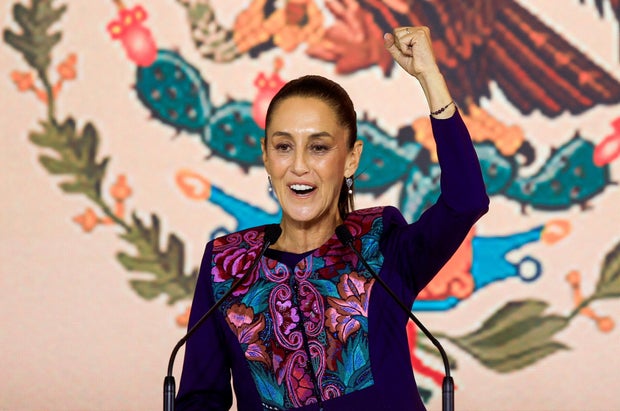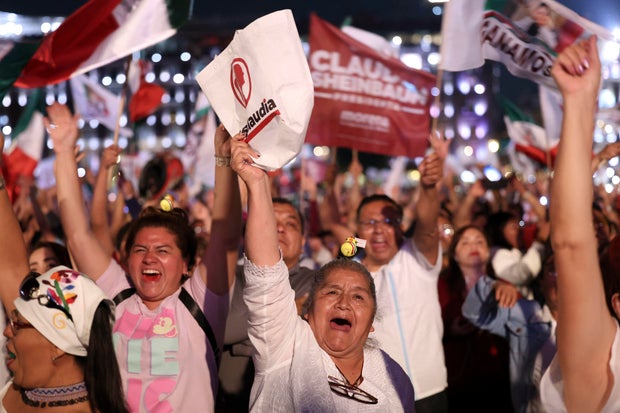Mexico’s expected presidential winner, Claudia Sheinbaum, will become the first female president in the country’s 200-year history.
The climate scientist and former mayor of Mexico City said Sunday evening that her two competitors had called her and conceded her victory.
“I will be the first female president of Mexico,” Sheinbaum said with a smile, speaking at a downtown hotel shortly after election authorities announced that a statistical sample showed her with an irreversible lead. “I won’t make it alone. We all made it, with our heroines who gave us our homeland, with our mothers, our daughters and our granddaughters.”
“We have shown that Mexico is a democratic country with peaceful elections,” she said.
Raquel Cunha / REUTERS
According to the president of the National Electoral Institute, Sheinbaum had between 58.3% and 60.7% of the vote according to the statistical sample. Opposition candidate Xóchitl Gálvez had between 26.6% and 28.6% of the votes and Jorge Álvarez Máynez had between 9.9% and 10.8% of the votes.
The preliminary counting, which started very slowly, gave Sheinbaum a 27-point lead over Gálvez, with 42% of polling stations counted shortly after her victory speech.
The ruling party candidate campaigned on continuing the political course set by her political mentor, President Andrés Manuel López Obrador, over the past six years.
His anointed successor, the 61-year-old Sheinbaum, led the campaign from thread to thread despite a spirited challenge from Gálvez. This was the first time in Mexico that the two main opponents were women.
“Of course, I congratulate Claudia Sheinbaum with all my respect, who ultimately became the winner by a wide margin,” López Obrador said shortly after the election authorities’ announcement. “She will be the first (female) president of Mexico in 200 years.”
If the margin holds, this would approach his landslide victory in 2018. López Obrador won the presidency after two failed attempts with 53.2% of the vote, in a three-way race in which National Action took 22.3% and the Institutional Revolutionary Party 16.5%. %.
SILVANA FLORES/AFP via Getty Images
Previously, Gálvez wrote on the social platform X: “The voices are there. Don’t let them hide them.”
Sheinbaum, described by Agence France-Presse as a “committed leftist known for keeping a cool head in times of crisis,” is the granddaughter of Bulgarian and Lithuanian Jewish migrants, AFP points out.
But AFP quotes Pamela Starr, a professor at the University of Southern California, as saying that unlike López Obrador, Sheinbaum is “not a populist.”
“She is much more of a mainstream left-wing politician” and probably “less ideological” than the outgoing president, Starr said.
Sheinbaum is unlikely to enjoy the kind of unquestioned devotion that López Obrador has enjoyed. Both belong to the ruling Morena party.
In Mexico City’s main colonial-era plaza, the Zocalo, Sheinbaum’s leadership did not initially draw the kind of cheering, jubilant crowds that greeted López Obrador’s 2018 victory.
Fernando Fernández, a chef, 28, joined the relatively small crowd hoping for a Sheinbaum win, but even he acknowledged there were problems.
“You vote for Claudia, for AMLO, out of conviction,” Fernández said, referring to López Obrador by his initials, as most Mexicans do. But his greatest hope is that Sheinbaum “can improve what AMLO could not: the price of gasoline, crime and drug trafficking, which he failed to combat even when he was in power.”
Itxel Robledo, 28, a business major, also expressed hope in the crowd that Sheinbaum would do what López Obrador did not. “What Claudia needs to do is deploy professionals in every area.”
Elsewhere in the city, Yoselin Ramírez, 29, said she voted for Sheinbaum but split her vote among other posts because she didn’t want anyone to have a strong majority.
“I don’t want everything to be occupied by the same party, so that there can be a little more equality,” she said, without elaborating.
The main opposition candidate, Gálvez, a technology entrepreneur and former senator, sought to capitalize on Mexicans’ security concerns and promised a more aggressive crackdown on organized crime.
Nearly 100 million people were registered to vote, but turnout appeared slightly lower than in previous elections. Voters also elected governors in nine of the nation’s 32 states, and elected candidates to both houses of Congress, thousands of mayors and other local posts, in the largest elections the country has ever seen or held. characterized by violence.
The election was widely seen as a referendum on López Obrador, a populist who has expanded social programs but has largely failed to reduce cartel violence in Mexico. His Morena party currently holds 23 of the 32 governorships and a simple majority of seats in both houses of Congress. The Mexican Constitution prohibits the re-election of the president.
Sheinbaum vowed to continue all of López Obrador’s policies, including a universal pension for the elderly and a program that pays young people to apprentice.
Gálvez, whose father was native Otomi, grew up from selling snacks on the streets of her poor hometown to starting her own tech companies. As a candidate for a coalition of major opposition parties, she left the Senate last year to direct her anger at López Obrador’s decision to avoid confrontation with the drug cartels through his “hugs, not bullets” policy. She vowed to go after criminals more aggressively.
The biggest points of contention
Mexico’s continued cartel violence and mediocre economic performance were the main issues on voters’ minds.
Julio García, an office worker in Mexico City, said he voted for the opposition in Mexico City’s central San Rafael neighborhood. “They robbed me twice at gunpoint. You have to change direction, change leadership,” the 34-year-old said. “If we continue the same way, we will become Venezuela.”
On the outskirts of Mexico City, near San Andres Totoltepec, election officials passed by 34-year-old housewife Stephania Navarrete, who saw dozens of cameramen and election officials gathered at the site where Sheinbaum was scheduled to vote.
Navarrete said she planned to vote for Sheinbaum despite her own misgivings about López Obrador and his party.
“With a female president, for me as a Mexican woman, it will be the same as in the past, when for the simple fact that you say you are a woman, you are limited to certain professions. Not anymore.”
She said the social programs of Sheinbaum’s mentor were crucial, but added that the worsening of cartel violence in recent years was her main concern in this election.
“That’s something they need to focus on more,” she said. “For me, safety is the biggest challenge. They said they would lower the crime rate, but no, it was the opposite: they skyrocketed. Obviously I don’t blame the president entirely, but in a way it is his responsibility.”
In Iztapalapa, Mexico City’s largest neighborhood, Angelina Jiménez, a 76-year-old housewife, said she came to vote “to put an end to this inept government that says we are doing well and that there is (still) there are always) so many deaths.”
She said the violence ravaging Mexico really worried her, so she planned to vote for Gálvez and her promise to take on the cartels. López Obrador “says we are better, but that is not true. We are worse.”
López Obrador claims he has reduced the historically high murder rate by 20% since coming to power in December 2018. But that’s largely a claim based on a dubious reading of the statistics. The actual murder rate appears to have fallen by only about 4% in six years.
Similarities between the US and Mexico in the elections
Just as the upcoming November rematch between President Biden and former President Donald Trump has underscored the deep divisions in the US, Sunday’s elections revealed how seriously public opinion in Mexico has been polarized over the country’s direction, including its security strategy and way the economy can grow. .
In addition to the battle for control of Congress, the battle for mayor of Mexico City – a post now considered equivalent to a governorship – is also important. Sheinbaum is just the youngest of many Mexico City mayors, including López Obrador, who ran for president. Governorships in large, densely populated states such as Veracruz and Jalisco are also attracting interest.








